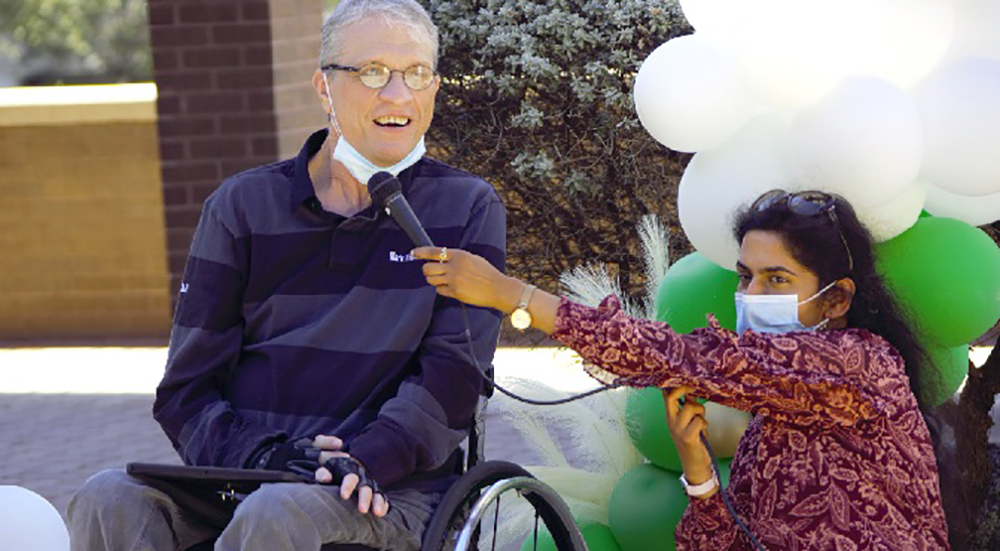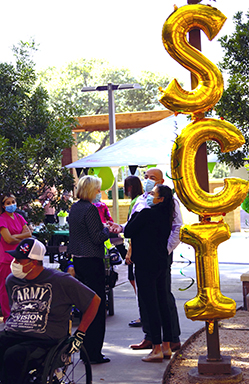Patients, staff and families gathered at a beautifully decorated South Texas VA Spinal Cord Injury (SCI) Center courtyard November 16. They were there to celebrate a major milestone for the clinic: 30 years of serving Veterans.
Guest speaker and South Texas Chief of Staff Dr. Julianne Flynn put that timeframe into context for the guests. “30 years ago, Microsoft released MS DOS 5.0, the internet was just made available for commercial use with less than 1 million users, and [Super] Nintendo was one of the hottest Christmas presents around.”
If you are not a tech historian, or bad at math, the year was 1991. The concept of SCI Centers was not new. World War II brought on the birth of SCI as a discipline in the late 40’s. After four decades, San Antonio was the second center in Texas.
Since that opening, thousands of patients have wheeled through the halls of the unit that has 26 beds and currently serves 550 Veterans on an outpatient basis.
“We offer various rehabilitation services that include physical, occupational and recreational therapy, along with driver’s training and speech therapy,” said Dr. Divya Singhal, neurologist and chief of the SCI Center.
Now offering Whole Health activities
Most recently, they now offer whole health activities, like mindfulness, acupuncture, group therapy and complex pain management, and look forward to expanding more interdisciplinary services in the coming years.
“It’s remarkable to consider how much has changed since then and how many innovations have occurred. VA has been a leader in innovative approaches in spinal cord injury patients for at least the last 30 years,” said Flynn.
Many anniversaries look back on the roads previously travelled. Singhal introduced Dr. Mark Fredrickson, former chief of the San Antonio SCI, who learned right from the beginning, cutting his teeth in SCI right after finishing his residency.
VA’s unique role has system unlike anything else
“There is a unique role the VA SCI system has that is unlike anything else,” said Fredrickson. “They combine acute rehab, ongoing, or sustaining primary care, vocational and avocational rehab services and even support for community living.”
Fredrickson added that you can’t find this level of comprehensive service in the private sector, for which he currently works.
“We try to pull all of these services together, but much of my time is actually spent trying to find those resources in the community and pull them together for somebody with a brand-new spinal cord injury,” he said.
Fredrickson noted that only 10 percent of the spinal cord injured in World War I even made it off the battlefield. That increased to 40 percent during World War II. He emphasized that despite those gains, it was still a rather sobering statistic.
“That was then,” he added. “Now, the future for the spinal cord injured is better than ever. A person with a spinal cord injury today – with proper management – is going to live almost a normal lifespan. Having worked on this unit, I know you have patients well into their 80s, and sometimes even their 90s, exceeding every lifespan expectation. That really is a credit to what you guys are doing here in terms of your comprehensive management.”
Six surgeries, in hospital for a year
One of those Veterans is Daniel Castillo.
“I guess I’m one of those successful stories in SCI,” Castillo said. “I’m now going to hit my 35th year in the wheelchair. Dr. Fred was here and he took care of me for a while. Dr. Chandler and Greg Morton and all these guys that work with them, even some of the new docs. They got me through six surgeries back in 2016 when I was in the hospital for about a year.”
Singhal said leading and being a part of the SCI team is a personal passion of hers. She was a caregiver for her grandmother with SCI. She has a special appreciation for the individualized care, cohesive teamwork and innovative therapy programs that can empower our Veterans in unique and powerful ways.
“Congratulations to all of you for all your incredible work,” Flynn concluded. “Let’s keep up the innovative, Veteran-centric approaches as we move into the future.”
Topics in this story
More Stories
Bob Jesse Award celebrates the achievements of a VA employee and a team or department that exemplifies innovative practices within VA.
The Medical Foster Home program offers Veterans an alternative to nursing homes.
Watch the Under Secretary for Health and a panel of experts discuss VA Health Connect tele-emergency care.








Great work